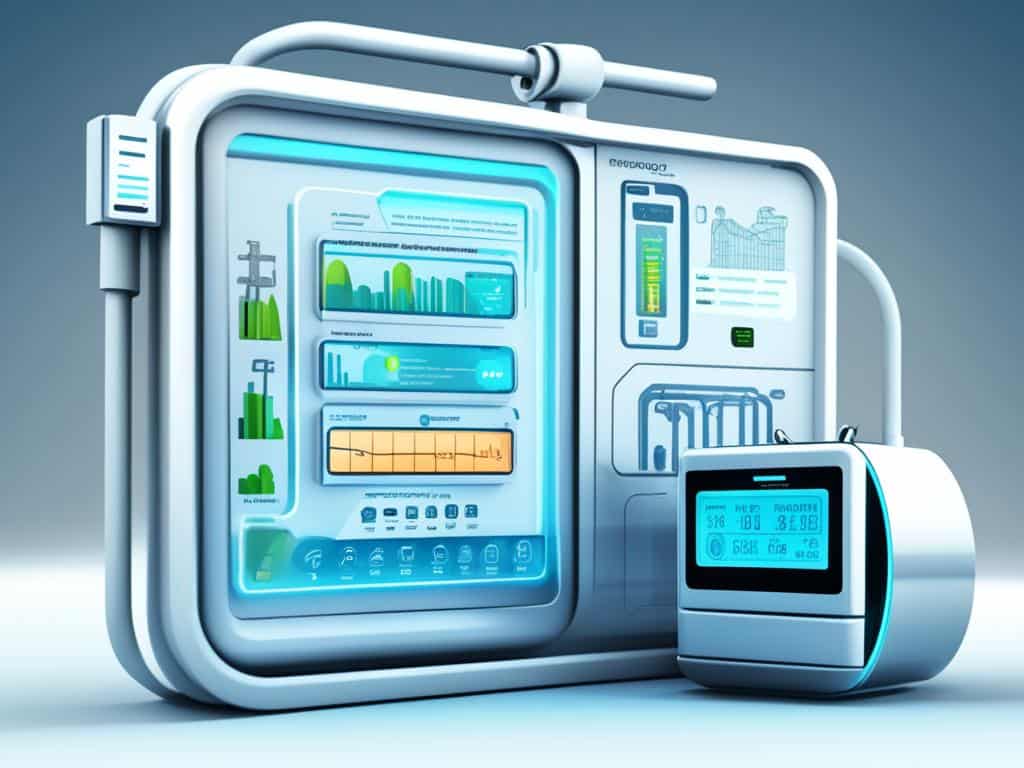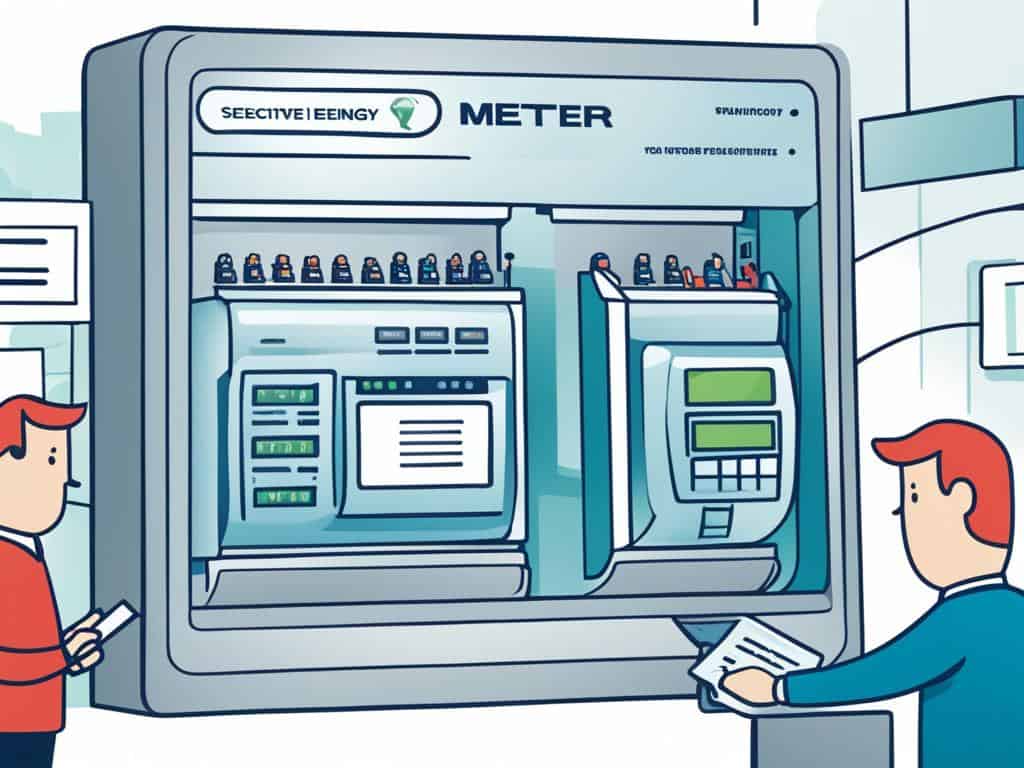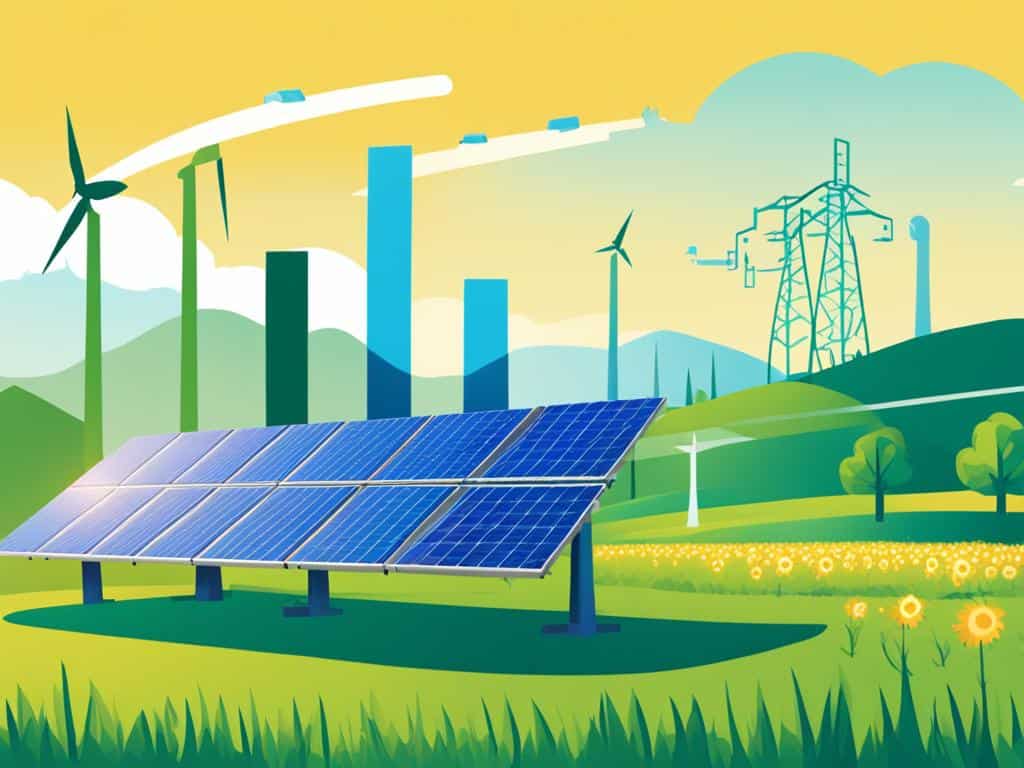Electronic Energy Meter: Understanding Its Identity
Discover the future of power monitoring with an electronic energy meter – your partner in tracking and managing energy consumption efficiently.

Picture lowering your electricity bill and gaining deep insights into how you use energy. The world still mainly uses fossil fuels, making up 62% of energy use in 2021. At this point, our electric grids are pretty one-sided. But, Smart Grids (SGs) and Smart Meters (SM) are changing the game:
These innovations promise to change the old one-way chat into a two-sided conversation. A smart meter turns a basic electric meter into a tool that tracks energy use and monitors power. This change is huge. It’s a big step towards better power management, cutting down on waste, fighting climate change, and supporting sustainability.
Fenice Energy is helping make this big shift. They’re pushing for the use of smart meters. Fenice Energy aims to help India install 250 million smart meters by 2026. This will make energy use more efficient and cut the losses that cost DISCOMs over INR 100,000 crores a year.
As we move towards digitally upgraded homes, let’s dive into how your home might already be getting an energy makeover. Fenice Energy is leading this exciting change.
Key Takeaways
- Smart Meters can save homes about 12% on electricity each year, and even more for businesses.
- Smart Grids and Smart Meters allow for back-and-forth talks between utility companies and customers. This makes things more efficient and lowers costs.
- Setting up Advanced Metering Infrastructure (AMI) involves smart meters, MDCs, MDMs, and HANs. This creates a well-connected and responsive energy network.
- Fenice Energy’s skills in setting up smart meters are key. They’re helping India use clean energy better and reduce power loss.
- AMI systems give users details on hourly electricity rates and tools for smarter electricity use. This helps cut down high usage periods and gives more control over energy use.
The Role of Electronic Energy Meters in Smart Grids
Smart grids are changing energy distribution in India, thanks to smart electricity meters. These meters are key for efficient transmission and energy management. They greatly improve the electric network’s efficiency and reliability.
In 2021, India saw a 20% loss in electricity transmission and distribution. However, states like Gujarat, Tamil Nadu, and Delhi made big strides in reducing these losses. Smart electricity meters, available in single-phase and three-phase versions, are at the heart of this progress. They provide detailed energy usage data in real time. This not only cuts losses but also supports smarter energy strategies.
A team-up between Genus Power Infrastructures and GIC, Singapore invested INR 2 billion in smart metering in India. The Indian Smart Grid Forum (ISGF) also backed this move. They aim for affordable, standard power solutions that benefit everyone.
Defining the Smart Grid and Its Advantages
Smart grids use Advanced Metering Infrastructure (AMI) to change how we distribute and manage energy. This system includes home networks (HAN), neighborhood networks (NAN), and wide area networks (WAN). It allows a bi-directional flow of information between utilities and consumers. This brings lots of benefits. It helps with managing energy demand, gives consumers accurate bills and efficient energy use, and supports government’s renewable energy efforts and CO2 reduction.
India now has both old electromechanical meters and modern electronic meters. We are moving towards fully smart meters. These offer real-time data. This is crucial for spotting outages, detecting theft, and adjusting prices dynamically.
Challenges of Cybersecurity in Smart Metered Grids
As more smart grids are used, the need for strong smart meter cybersecurity and energy data protection grows. These systems are complex and use many types of data communication, like LAN, NAN, WAN, ZigBee, WiFi, and PLC. They face many cybersecurity threats. These could be data breaches or risks to the whole energy distribution system.
To address security, smart grids must have strong security designs. This includes using Power Line Communication (PLC) for safe data transfer. As technology advances, so must our security measures. We must keep ahead of new cyber threats.
| Smart Meter Configuration | Efficiency Gain | Key Advantages |
|---|---|---|
| Single-Phase | Reduction in energy theft | Improved billing accuracy |
| Three-Phase | Enhanced load management | Real-time pricing, Outage detection |
Fenice Energy is pushing for cleaner energy in India. This includes secure smart meter technology. Going forward, teamwork between public, private, and research sectors will bring efficient and secure energy systems.
Emergence of Smart Electricity Meters: A Revolution in Energy Management
In India, the way we measure electricity is changing fast. This is because of a big goal to make power distribution better and to start using smart electricity management practices. At the heart of this change is the use of Advanced Metering Infrastructure (AMI). This tech moves us from an old-school electricity supply to a service that talks back to customers.
Fenice Energy is leading the way with smart grids and AMI systems. This push by the company, along with projects across the country, is changing how we keep an eye on energy use.
Linking smart meters with the utility grid paves the way for better operations. These gadgets show us exactly how much energy we’re using as it happens. Plus, they make it easier to use energy from the sun and wind.
| Project | Scope | Projected Outcomes |
|---|---|---|
| Smart Grid Naroda Pilot Project | Installation of 27,000+ smart meters | Comprehensive AMI, peak load management, renewable integration, SCADA-based outage management |
| UGVCL RDSS Initiative | Installation of 35+ lakh smart meters | Dynamic interactive network, enhanced distribution system control |
| R-APDRP in Ahmedabad Town | Real-time monitoring for 1.44 lakh consumers | SCADA/DMS for advanced control over distribution |
| National Target by 2025 | 250 million smart meters | Reduction in technical and commercial losses by 12-15% |
| Current Installation | 8.6 million smart meters | Overall annual technical loss cut |
Right now, 34% of energy gets lost in technical and commercial issues. But, by installing smart meters, we’re seeing a bright future for India’s energy scene. If we hit our target of 250 million smart meters by 2025, we could cut losses to just 12-15%. This would make energy distribution much more accurate and dependable.
The Indian government is also investing a lot in making power greener, especially in rural areas. Fenice Energy is at the forefront, providing the tech and know-how needed.
This big change in how we measure electricity, supported by big money and expertise, is set not just to improve how we distribute power. It’s also aiming to make smart electricity management a common thing in India’s vast and varied lands.
Advancements in Smart Meter Technology and Consumer Transparency
Smart meters are changing how we monitor energy and offer better insights to users. India aims to install 25 Crore of these meters. These devices are being placed in homes and businesses, promoting efficient energy use and active participation.
Real-Time Energy Usage Monitoring
Today’s smart meters measure power instantly, which is essential for managing energy well. By November 2020, India had installed 19 Lakh smart meters. They come with advanced features like two-way communication. This not only makes billing clear but also helps in managing power use and improving the efficiency of power distribution.
Enhancing Customer Engagement through Data Accessibility
Smart meters allow users to see their energy use. This supports the Smart Meter National Program (SMNP) led by EESL. By knowing how much power they use, people can make smarter choices, use less energy, and engage more with smart grids. Thanks to a significant budget for FY22, smart meters are set to change how we interact with the power grid.
In places like Andhra Pradesh, there are big plans for installing these meters in farms. Other areas like Uttar Pradesh, Bihar, Haryana, Rajasthan, and Delhi are also focusing on adding many smart meters. Uttar Pradesh plans to add 24 Lakh smart meters.
Fenice Energy is working to support these smart grid technologies and India’s energy goals. By integrating these systems, Fenice Energy aims to make energy use more efficient for the future.
Comparative Analysis: Electromechanical vs. Electronic Energy Meters
The energy meter evolution has changed a lot over the years. We’ve moved from traditional electromechanical meters to electronic energy meters. This change is big for accuracy, how we integrate technology, and managing energy smartly. Electromechanical meters were good but their mechanical parts, like spinning discs, can’t match the electronic ones in precision.
We’re going to look at electromechanical meter comparison next to electronic ones. We’ll focus on their use in single-phase for homes and three-phase for industrial needs. It’s a good way to see which fits different uses better.
| Feature | Electromechanical Meter | Electronic Energy Meter |
|---|---|---|
| Voltage Capability | 230 Volts in single-phase | Up to 415 Volts in three-phase |
| Suitability | Lights, fans, TVs in homes | Heavy industrial applications |
| Efficiency | Less due to a fewer conductors | Higher, leveraging three phases |
| Transmission Smoothness | Prone to interruptions | Stable with fewer interruptions |
| Longevity | Subject to wear and inaccuracy | Accurate and durable (>10 years) |
| Installation | By technicians, prone to errors | Precision by qualified technicians |
Fenice Energy, a leader in smart energy solutions, tells us that electronic meters are key in India. They’re better because they last longer, are more accurate, and help save energy. This is really important in crowded places.
These electronic devices are great in simple homes and big industrial places. For example, they help power heavy machines with sophisticated wiring. Electronic meters are perfect for this kind of work.
As we need more robust energy systems, electronic meters become more essential. Experts install them making sure the job is done right. They play a big part in using energy wisely and planning for the future. In the end, electronic meters are now preferred, matching India’s goals for a better energy future.
Electronic Energy Meter as a Pillar for Efficient Power Consumption
Modern power systems rely on electronic energy meters. They are key for accurate energy measurement and a culture of efficient use. These digital meters align with the U.S. Department of Energy’s push for better energy use.
Buildings and factories emit a lot of carbon, but digital meters help reduce it. By guaranteeing reliable electricity tracking, they support efforts to cut down on greenhouse gases. This aligns with goals for more efficient industry and less carbon.
The Accuracy Advantage of Digital Meters
Digital meters bring top-notch accuracy to monitoring power use. They use high-tech converters to get accurate energy measurement with very little error. This precision gives users reliable electricity tracking and makes billing more trustworthy. This builds trust between users and providers.
User-Friendly Interfaces and Easy Installation
Electronic energy meters are not only precise but also easy to use. Their user-friendly design helps users understand and improve their energy habits. Energy consumption tracker installation is also easy, leading to more people using them. This encourages better management of electricity.
Electronic meters have brought about energy-efficient products that save Americans billions. This shows how well digital power meters work with other tools to reduce wasted energy.
Smart grids with these meters enhance sustainability. They eliminate manual readings and use power smarter. This helps not just people but the bigger aim of cutting unnecessary energy use. It’s key to true efficiency.
Fenice Energy sees the big impact of these technologies on sustainability and economics. By installing energy consumption trackers, Fenice leads the way to a cleaner energy future. This helps India move towards efficiency as both a goal and a commitment.
The Importance of Building a Secure Identity for Smart Meters
Smart meters are crucial in today’s energy networks around the world. Their security is key to fight cyber threats and manage energy well. These meters are vital for a safe energy communication network. A strong security structure is essential to protect interconnected meters. This is especially important as the EU expects nearly 250 million smart meter installations by 2026.
Essentials of a Secure Smart Meter Architecture
Smart meters are growing fast, with over 35 million in France alone. This growth shows the need for solid smart meter security. Each meter must be an authenticated energy device within the smart grid. Keys to this system are the ISMSs which focus on keeping data safe. ISMSs, following the PDCA cycle, help in continuously improving smart grid security.
EU Regulations and Cyber Resilience in Energy Metering
The EU’s Cyber Resilience Act strengthens energy communication and metering standards. Recommendations, like 2019/553 from the European Commission, push for better encryption and cybersecurity. Following EU regulations helps protect against cyber threats. It also matches trends in North America and plans in Asia’s leading countries.
Innovation is shaping the move towards secure smart grids. Techniques like ECC and PUF are making grids safer. Yet, ECC’s high costs pose challenges. Thankfully, cloud-based SECaaS models offer low-cost solutions like EaaS to improve security. Fenice Energy is adopting these advanced security measures to support India’s energy future.
Integrating Renewable Energy Sources with Smart Energy Usage Monitors
The need for renewable energy integration is urgent. About 40 percent of gas supplied to European Union countries is from Russia. This creates a risky energy situation during geopolitical conflicts. Smart technology, like energy usage trackers and smart power management systems, is making a big difference.
Smart energy meters are at the forefront of this change. They are vital for monitoring electrical systems in real-time and promoting efficient power use. These devices get rid of the need for manual meter readings every month. This is a big step forward in managing energy better.
- Smart meters can monitor many electrical aspects, like current and voltage. They work as full energy usage trackers.
- They even use IoT (Internet of Things) and blockchain for peer-to-peer (P2P) energy exchanges. This lets users trade extra power easily.
- Blockchain and IoT can also lower energy costs by 25%. They do this through smart energy management systems.
- These technologies support local energy production. They aim to reduce energy loss and boost neighborhood power generation.
Fenice Energy, with over 20 years of experience in clean energy, sees the value of these technologies for India. By using these smart systems, Fenice Energy not only promotes sustainable power but also allows people to actively participate in the energy market. This innovation is paving the way for a future where renewable energy is used more efficiently, leading to a more stable grid and better clean energy use.
Fenice Energy’s Commitment to Advanced Energy Solutions
Fenice Energy is deeply committed to leading India’s energy revolution through cutting-edge clean energy technology. They bring over two decades of expertise and always aim for innovation. This dedication helps transform the nation’s energy scene.
Innovations in Solar and Evolving Smart Meter Technologies
Fenice Energy is at the forefront with their innovative solar solutions. They are changing how we use energy with their smart meters. These developments make using solar energy better and easier for everyone.
Fenice Energy’s work doesn’t only bring small changes. It transforms the whole system of managing energy. By introducing their solutions, they are leading us to use more renewable and reliable energy sources.
Contributions to India’s Clean Energy Transition
Fenice Energy’s impact goes beyond new gadgets. Their solar power and smart meter innovation help India move to cleaner energy. They help homes and businesses use energy smarter and encourage communities to be more eco-friendly.
| Energy Solution | Brief Description | Impact on India’s Energy Transition |
|---|---|---|
| Fenice Solar Solutions | Eco-friendly power generation leveraging sophisticated solar technology. | Facilitates sustainable energy adoption, decreasing fossil fuel reliance. |
| Smart Meter Technology | Innovative meters for efficient energy monitoring and management. | Enables data-driven energy savings and supports national grid modernization. |
| EV Charging Solutions | Scalable and accessible electric vehicle infrastructure services. | Supports the growth of electric mobility, leading to reduced carbon emissions. |
Thanks to Fenice Energy, our environment and economy are both improving. They aim to make clean energy technology the norm. Fenice Energy is dedicated to helping India achieve a sustainable and prosperous future.
The Critical Role of Public Key Infrastructure in Energy Meter Identity
India is moving fast into advanced energy solutions. The country is setting up 250 million smart meters by 2025. Fenice Energy is at the forefront, providing top-notch power management. Public key infrastructure (PKI) is crucial here. It makes sure each energy meter is authentic. This lays the groundwork for trusted key management.
PKI is the security backbone for modern metering. It creates a protected space for transactions between smart meters and the grid. They can be safely checked and confirmed. PKI’s role goes further than just checking identities; it ensures smart meter compliance with new standards. This includes the Cyber Resilience Act in the EU, which sets strict security rules for smart meters.

Trusted Key Management for Ensuring Device Authenticity
Protecting smart meters from cyber threats is crucial. It also keeps the grid safe from tampering. By 2026, the EU expects nearly 250 million smart energy devices to be up and running. PKI provides trusted key management. This allows devices to be recognised as genuine parts of the network. This confirms their integrity and energy meter authenticity.
Using hardware security modules, like Thales’s TKI-based ones, advances secure device processes. This push forward was seen when Italy united over 32 million customers with its Telegestore project. A future where secure energy distribution is reliable thanks to trusted security.
Compliance and Standardization across Smart Meter Devices
Making metering standard is key for international cooperation within the energy field. PKI is essential in keeping smart meter compliance consistent across different areas and makers. Compliance efforts range from strict audits in Jammu & Kashmir to varied needs in Haryana’s discoms. Standardization in metering makes various protocols work together smoothly.
Fenice Energy works to make its smart meter tech comply with these standards. This ensures a reliable and secure link between users and the grid. PKI supports this by validating device identities. It also aligns devices with secure protocols.
Standardization makes economic sense, too. The European Commission sees an investment of ₹3.53 lakh crore (€40.7 billion) in metering by 2030 in the EU. This shows a big commitment to enhancing energy efficiency and responsibility globally.
PKI boosts the security level of meters and builds public trust in energy sharing. Fenice Energy is pushing for smart meter use, highlighting PKI’s importance. We’re dedicated to adding these safety tools to our smart meters. For India, adopting PKI’s solid structure not only provides protection but also transforms energy management for the future.
Future-Proofing Energy Distribution with Smart Electricity Meters
The arrival of smart electricity meters is a big step in making energy systems better. These devices are key in making power networks strong and ready for anything. They help utilities and customers by providing detailed energy use and new ways to manage it.
Companies worldwide see the value in these meters and are investing heavily. For example, Enel leads with its Circular Smart Meter and Open Meter, showing the benefits of green energy practices.
| Smart Meter Innovation | Environmental Impact | Technological Advancements |
|---|---|---|
| Enel’s Circular Smart Meter | CO2 savings of 7 kg over a 15-year lifespan | Real-time monitoring and dynamic pricing |
| Recycled Material Usage | Saves 1.1 kg of virgin material | Aligns with FTSE4Good Index sustainability criteria |
| Open Meter by Enel | Promotes energy efficiency with photovoltaic system integration | Facilitates electric car usage services |
| Tata Power’s AMR Success | – | 98% success rate in Mumbai, efficiency in billing and data analysis |
In India, Tata Power is making great strides with smart meters. They’ve successfully rolled out an Automated Meter Reading (AMR) system. This is changing how India distributes energy.
- In 2009, Tata Power introduced the AMR system to all industrial and commercial consumers, making Mumbai’s grid smarter.
- The Distribution Management System (DMS) in Mumbai gets a big boost from smart meters, making power restoration faster.
- With 22,000 AMR-ready meters, Tata Power’s impact is growing in northern India, showing how useful smart meters are.
Fenice Energy is also working to improve India’s power setup with smart technology. Their work supports the country’s goals for energy security and being green.
Companies like Enel are passing the baton to subsidiaries like Gridspertise, keeping the momentum of smart electricity meters going strong. They offer custom rates and ways to monitor energy, opening new doors in energy saving and customer power. This push by Fenice Energy and others is making energy systems of the future a reality, blending tech, teamwork, and sustainability.
This blend of new ideas, smart deployment, and working together is crucial for future energy systems. With smart meters, we’re building a future that’s not just sustainable, but also smart and capable of meeting tomorrow’s needs.
Conclusion
The arrival of electronic energy meters marks a big step forward in the development of smart grids. These devices ensure we measure electricity use with great accuracy. This accuracy helps with fair billing and making smart energy choices.
Smart meters also help in two-way communication between customers and energy providers. This supports real-time tracking and precise billing. They are crucial for modern energy systems.
Smart meters protect our data with high-level encryption. This security is critical, especially in countries like India. Here, energy digitalization needs strong protection from cyber threats. Additionally, these meters are built to be energy-efficient. They use low-power components and smarter modes to reduce energy waste.
Fenice Energy is a leading provider of advanced energy solutions. They focus on the positive effects of using renewable energy and easy-to-use interfaces. Smart meters, along with Fenice Energy’s offerings, help manage power better. They also make it easier to use solar power. This effort supports sustainability and energy saving.
By promoting smart meters with proper setup and modern tech, Fenice Energy is helping India achieve a secure, transparent energy future. As we explore the vast areas of energy management, it’s the blend of new technologies, their acceptance, and careful use that will build a strong, green power network.


